Did you know that more than 46 million homes in the U.S. have a cat? That’s a staggering number of furry companions bringing joy to households across the country. However, for those with allergies, owning a cat can be a challenge. The good news is that there are hypoallergenic cat breeds available that produce lower levels of allergens, making them suitable for allergy sufferers.
Key Takeaways:
- There are hypoallergenic cat breeds that produce lower levels of allergens.
- These cat breeds are suitable for people with allergies.
- Hypoallergenic cat breeds can bring joy and companionship to allergy sufferers.
- Choosing a hypoallergenic cat breed can help minimize allergy symptoms.
- Researching and understanding hypoallergenic cat breeds is essential for finding the perfect feline companion for allergy sufferers.
Siberian Cats
When it comes to hypoallergenic cat breeds, Siberian cats are a popular choice among cat lovers. Despite their thick and long hair, Siberians produce lower levels of allergen-causing proteins compared to many other cat breeds. This makes them suitable for individuals with allergies who still want to enjoy the companionship of a feline friend.
Not only are Siberians hypoallergenic, but they are also known for their friendly and affectionate nature. They are often described as gentle giants, as they are larger than the average cat and have a robust physique. Siberians are known to be gentle with children and get along well with other pets, making them great additions to family households.
One of the unique qualities of Siberian cats is their triple-layered coat, which helps protect them from the harsh Siberian climate. While regular grooming is necessary to keep their coat healthy, their fur is less likely to trigger allergies since they produce fewer allergenic proteins.
If you’re considering a Siberian cat as your newest family member, it’s important to note that they are highly social creatures who thrive on human companionship. They enjoy being involved in all aspects of family life and will eagerly participate in various activities. Whether it’s playing, exploring, or simply lounging beside you, a Siberian cat will bring joy and warmth to your home.
Siberian Cats: Key Attributes
- Hypoallergenic despite their thick and long hair
- Known for their friendliness and affection
- Suitability for families and households with children and other pets
- Triple-layered coat provides protection and insulation
- Require regular grooming for coat maintenance
- Highly social and thrive on human companionship
| Attribute | Siberian Cats |
|---|---|
| Hypoallergenic | Yes |
| Friendliness | Very |
| Suitability for Families | Excellent |
| Coat Type | Thick and Long |
| Grooming Needs | Regular |
| Social Behavior | Highly Social |
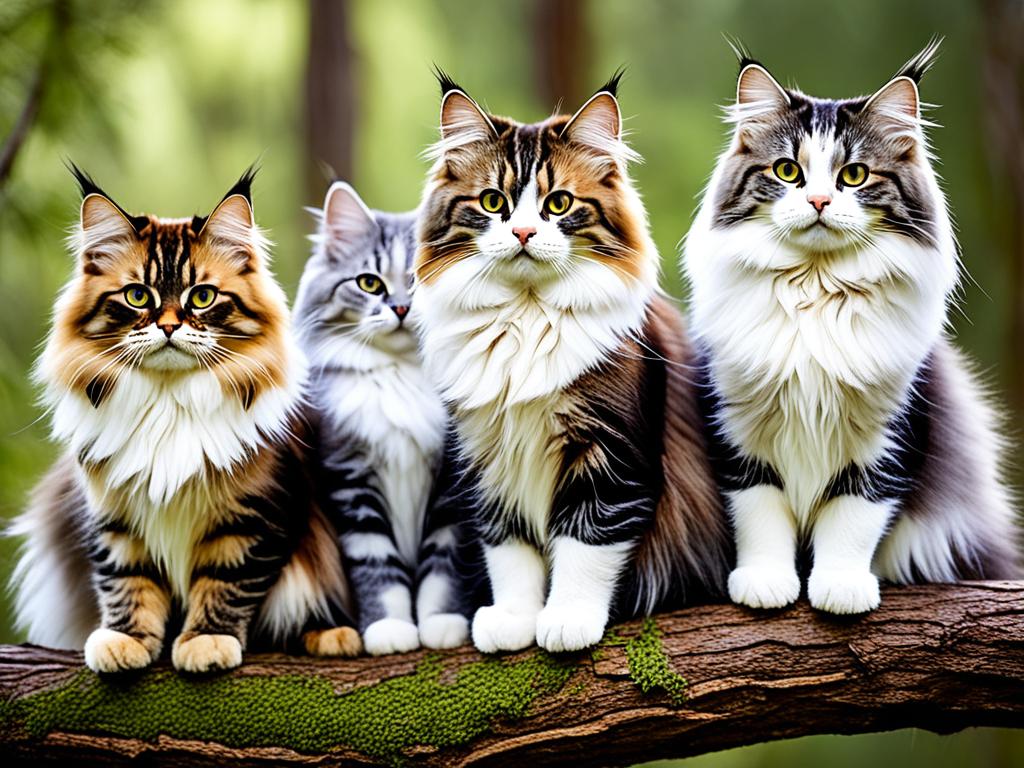
Siamese Cats
Siamese cats are a popular choice for those seeking hypoallergenic cat breeds. Their short coat does not shed heavily, reducing the production of allergens compared to other breeds. This makes Siamese cats a suitable option for individuals with cat allergies.
Aside from their hypoallergenic qualities, Siamese cats are known for their charming personality and affectionate nature. They form strong bonds with their pet parents and enjoy being involved in their daily activities. Siamese cats are often described as vocal and sociable, making them an excellent choice for those seeking a lively and engaging companion.
However, it’s important to note that Siamese cats may require attention and interaction. They thrive on companionship and may not be the ideal choice for families who are frequently away from home. If you have a busy lifestyle, it’s important to consider the time and effort required to meet the needs of this breed.
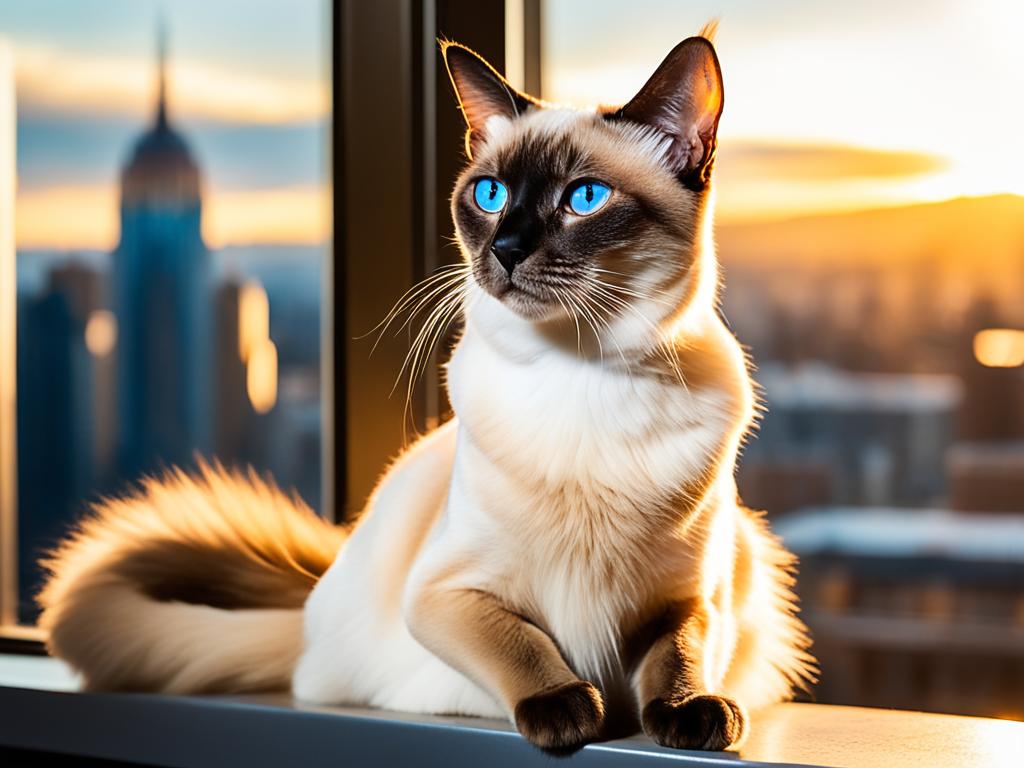
In summary, Siamese cats are hypoallergenic due to their short coat and low shedding. They produce fewer allergens, making them a suitable choice for individuals with allergies. Their vocal nature and affectionate demeanor make them a beloved breed among cat enthusiasts, but potential owners should be aware of their need for attention and interaction.
Bengal Cats
Bengal cats are a fascinating breed known for their unique hypoallergenic quality and stunning appearance. With their short, soft coat adorned with beautiful spots and their muscular build, Bengal cats have a distinct resemblance to their wild ancestors, the Asian leopard cats. This exotic appearance is often a major attraction for cat enthusiasts.
When it comes to hypoallergenic cat breeds, Bengal cats are a popular choice for allergy sufferers. Their hypoallergenic quality is attributed to their low production of allergen-causing proteins. This makes Bengal cats a suitable option for individuals who experience allergies when exposed to other feline breeds.
Besides their hypoallergenic nature, Bengal cats are cherished for their energy and intelligence. They are highly active and require mental stimulation, making them an engaging companion for households with plenty of room for play and exploration. Their curious nature and agility often lead them to climb, jump, and investigate their surroundings.
It’s important to note that Bengal cats are not suitable for all regions, as some cities have regulations or bans against owning them due to their wild ancestry. Therefore, it’s crucial to check local rules and regulations before considering a Bengal cat as a pet.
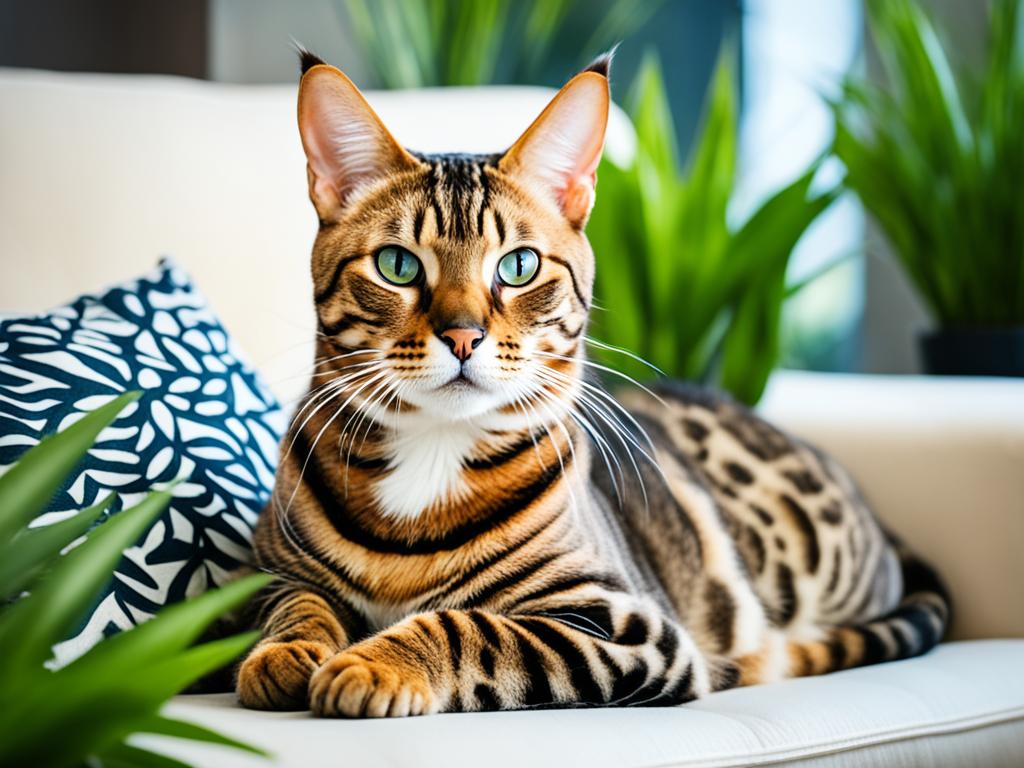
Key Features of Bengal Cats:
- Distinctive spotted coat resembling wild cats
- Hypoallergenic quality with low production of allergen-causing proteins
- Highly active and agile
- Intelligent and curious nature
Russian Blue Cats
Russian Blue cats are a popular choice among cat lovers for their hypoallergenic qualities. These elegant feline companions are not only visually stunning, but they also produce lower levels of allergens compared to other breeds. Let’s take a closer look at the characteristics of Russian Blue cats:
- Affectionate Personality: Russian Blue cats are known for their sweet and gentle nature. They form strong bonds with their human companions and enjoy spending quality time with them.
- Calm Demeanor: These cats have a calm and composed demeanor, making them an excellent choice for individuals seeking a relaxed and peaceful pet.
- Warm-Up Time: Russian Blue cats may take some time to warm up to new people and environments. Once they feel comfortable, they become affectionate and loving companions.
- Beautiful Appearance: With their plush blue-gray coat and striking green eyes, Russian Blue cats are undeniably beautiful. Their coat is dense and requires minimal grooming.
If you’re looking for a hypoallergenic cat breed that combines elegance, affection, and minimal allergenicity, Russian Blue cats are an excellent choice. Their calm and loving nature, coupled with their reduced allergen production, make them a perfect companion for allergy sufferers.
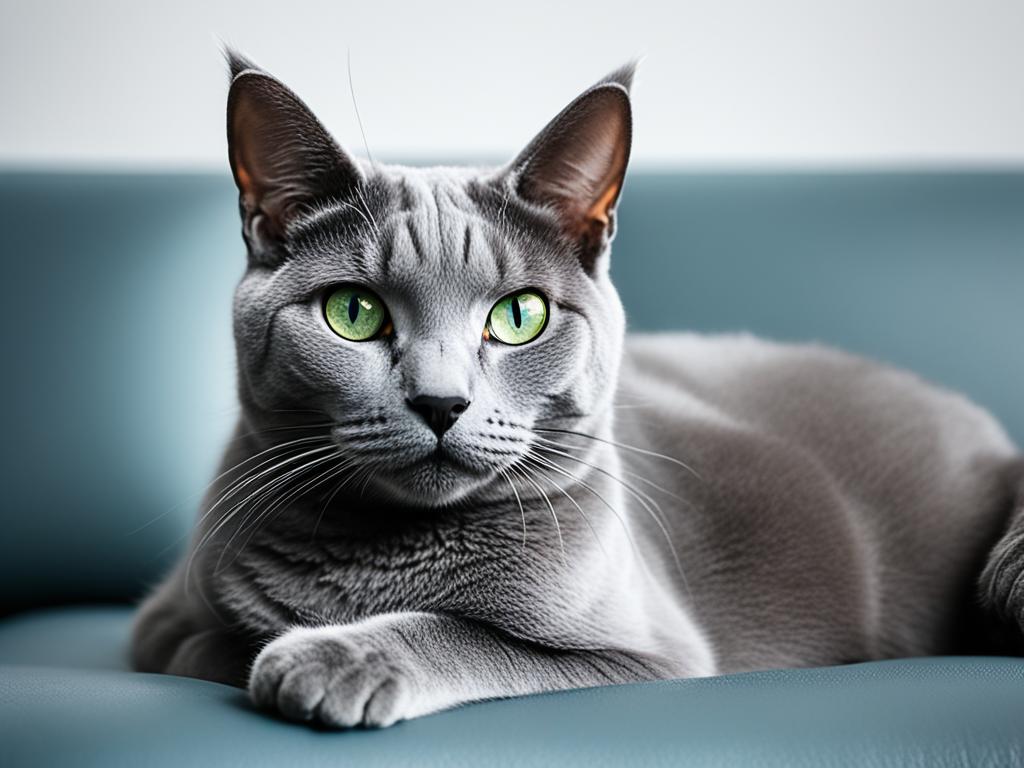
Sphynx Cats
Sphynx cats are a fascinating and unique hypoallergenic cat breed that is sure to capture attention. Known for their hairless or, sometimes, thin layer of peach fuzz, Sphynx cats have a distinct appearance that sets them apart from other feline breeds. Not only are they visually striking, but they also have qualities that make them suitable for allergy sufferers.
One of the key advantages of Sphynx cats for individuals with allergies is that they produce fewer allergens compared to many furry breeds. While all cats produce allergens, the reduced amount of hair and dander in Sphynx cats contributes to a lower allergenic potential. This feature makes them a popular choice for those who love cats but struggle with allergies.
Despite their lack of fur, Sphynx cats still require regular grooming for skin maintenance. Without fur to absorb oils, their skin can become oily, leading to potential skin issues. Grooming routines for Sphynx cats typically involve regular bathing and ensuring their skin is moisturized to maintain good overall health.
For those considering adopting a Sphynx cat, it is important to note that their lack of fur also means they may feel colder than other breeds, especially in cooler environments. Providing them with warm bedding, clothing (if necessary), and ensuring the home environment is comfortably heated will help keep them cozy and content.

Characteristics of Sphynx Cats:
- Unique hairless or peach fuzz appearance
- Produce fewer allergens compared to furry breeds
- Require regular grooming for skin maintenance
- May feel colder than other breeds due to lack of fur
| Advantages of Sphynx Cats | Considerations for Sphynx Cats |
|---|---|
|
|
Devon Rex and Cornish Rex Cats
When it comes to hypoallergenic cat breeds, Devon Rex and Cornish Rex cats are top contenders. These unique feline breeds are known for their curly hair, which sets them apart from other cats. The distinctive coat of the Devon Rex and Cornish Rex breeds contributes to their hypoallergenic qualities, making them a desirable choice for cat lovers with allergies.
One of the key advantages of Devon Rex and Cornish Rex cats is that they shed less hair compared to other breeds. This reduces the amount of allergens present in the environment and can alleviate the symptoms of allergic reactions. Additionally, these breeds are known for their affectionate and loving personalities, making them wonderful companions for both individuals and families.
While Devon Rex cats require attention and enjoy being the center of their human’s world, Cornish Rex cats are particularly playful and thrive on receiving attention from their owners. Both breeds are known to be highly social and enjoy interacting with their humans, creating a strong bond that can bring joy and companionship to any household.
Although Devon Rex and Cornish Rex cats share similar characteristics in terms of their hypoallergenic qualities, their distinct personalities offer unique experiences for cat lovers. The decision between the two will ultimately depend on individual preferences and lifestyle factors.
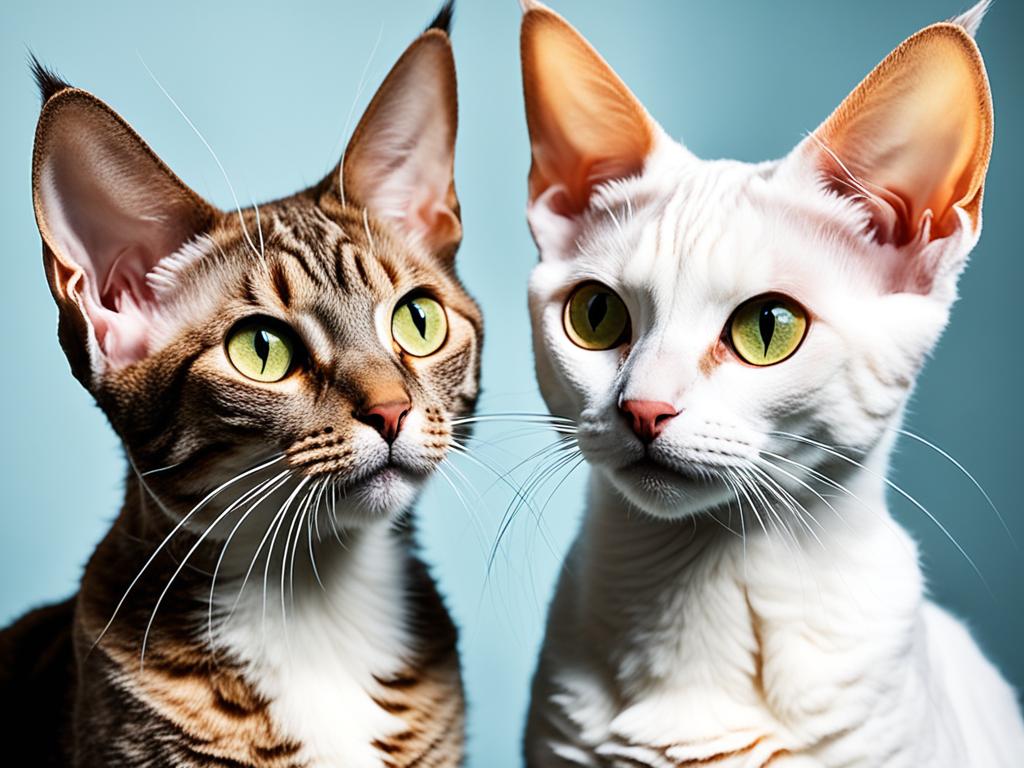
Key Points:
- Devon Rex and Cornish Rex cats have curly hair, contributing to their hypoallergenic qualities.
- These breeds shed less hair, reducing allergens in the environment.
- Both breeds are known for their affectionate and loving personalities.
- Devon Rex cats require attention, while Cornish Rex cats are particularly playful and thrive on attention.
- The choice between the two breeds depends on individual preferences and lifestyle factors.
Javanese Cats
Javanese cats are a fascinating breed known for their elegant and stylish appearance. These cats have long, silky coats that are reminiscent of their Balinese ancestors. While their beautiful fur may give the impression of high allergenicity, Javanese cats are actually hypoallergenic.
Unlike other cats that produce abundant allergens, Javanese cats produce fewer allergenic proteins, making them suitable for individuals with allergies. This is excellent news for cat lovers who have always dreamed of owning a feline companion but had concerns about potential allergic reactions.
To maintain their hypoallergenic qualities, Javanese cats require regular grooming. Brushing their coat helps remove loose hair and reduces the build-up of allergens. Additionally, grooming strengthens the bond between the cat and their owner, as it is a time of bonding and affection.
Javanese cats are not only hypoallergenic but also known for their unique personalities. They are vocal and playful, always ready for a game or interaction with their human family members. Their intelligence allows them to learn tricks and enjoy puzzle toys that stimulate their minds.
If you’re looking for a hypoallergenic cat breed that combines beauty, intelligence, and playful nature, Javanese cats are an excellent choice.

| Attributes | Description |
|---|---|
| Coat Length | Long and silky |
| Hypoallergenic | Yes |
| Grooming Needs | Regular brushing to remove loose hair |
| Personality | Vocal, playful, intelligent |
Balinese Cats
Looking for a hypoallergenic cat breed that combines elegance and allergy-friendly qualities? Look no further than Balinese cats. Often referred to as “longhaired Siamese,” Balinese cats produce lower levels of the allergenic protein Fel D1, which makes them a great choice for individuals with allergies.
Not only are Balinese cats hypoallergenic, but they also have a reputation for being affectionate and intelligent. They form strong bonds with their human companions and enjoy being a part of the family. Their playful and curious nature makes them suitable for households with children, as they are known to be patient and gentle.
With their striking blue eyes and flowing, silky coats, Balinese cats are a sight to behold. Their long, luxurious fur may require regular grooming to keep it looking its best, but it’s a small price to pay for the joy and companionship that these beautiful felines bring. Add a Balinese cat to your home, and enjoy the company of a hypoallergenic and loving companion.
FAQ
What are hypoallergenic cat breeds?
Hypoallergenic cat breeds are breeds that produce lower levels of allergen-causing proteins, making them suitable for people with allergies. While no cat is completely allergen-free, these breeds are known to be more tolerable for allergy sufferers.
How many homes in the U.S. have cats?
More than 46 million homes in the U.S. have a cat as a pet.
Are all hypoallergenic cat breeds the same?
No, hypoallergenic cat breeds vary in terms of their allergenicity. Some breeds produce fewer allergens due to their hair type, while others have a genetic disposition to produce lower levels of allergenic proteins.
What are the best hypoallergenic cat breeds for allergy sufferers?
Some of the best hypoallergenic cat breeds for allergy sufferers include Siberian cats, Siamese cats, Bengal cats, Russian Blue cats, Sphynx cats, Devon Rex and Cornish Rex cats, Javanese cats, and Balinese cats.
Are Siberian cats hypoallergenic?
Yes, Siberian cats are considered hypoallergenic. Despite their thick, long hair, they produce fewer allergen-causing proteins compared to many other cat breeds.
Are Siamese cats hypoallergenic?
Yes, Siamese cats are considered hypoallergenic. They have a short coat that doesn’t shed heavily, resulting in fewer allergens being released into the environment.
Are Bengal cats hypoallergenic?
Yes, Bengal cats have a unique hypoallergenic quality with their spotted short coat. However, it’s important to note that some cities have regulations or bans against owning them.
Are Russian Blue cats hypoallergenic?
Yes, Russian Blue cats are considered hypoallergenic. They have a lower level of allergens and are known for their calm and affectionate nature.
Are Sphynx cats hypoallergenic?
Yes, Sphynx cats are considered hypoallergenic. They are hairless or have a thin layer of peach fuzz, which means they produce fewer allergens compared to many furry cat breeds. However, they require regular grooming for skin maintenance.
Are Devon Rex and Cornish Rex cats hypoallergenic?
Yes, both Devon Rex and Cornish Rex cats are hypoallergenic. Their curly hair type results in less shedding and lower levels of allergens. Devon Rex cats require attention, while Cornish Rex cats are known for their love for attention and playfulness.
Are Javanese cats hypoallergenic?
Yes, Javanese cats are hypoallergenic. Despite their longer coats, they produce fewer allergens, making them suitable for cat lovers with allergies. Javanese cats require consistent grooming and are known for being vocal, playful, and intelligent.
Are Balinese cats hypoallergenic?
Yes, Balinese cats, often referred to as “longhaired Siamese,” are hypoallergenic. They produce less of the allergenic protein Fel D1, making them a good choice for people with allergies. Balinese cats are known for their affectionate and intelligent nature, making them suitable for various families.
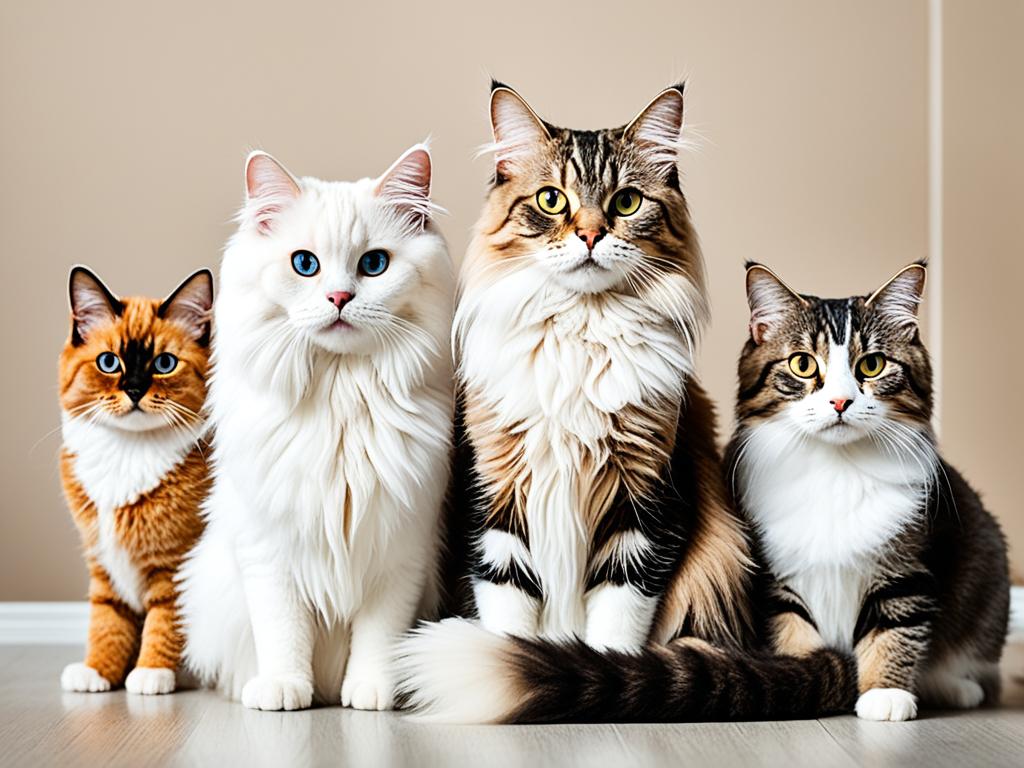
Leave a Reply